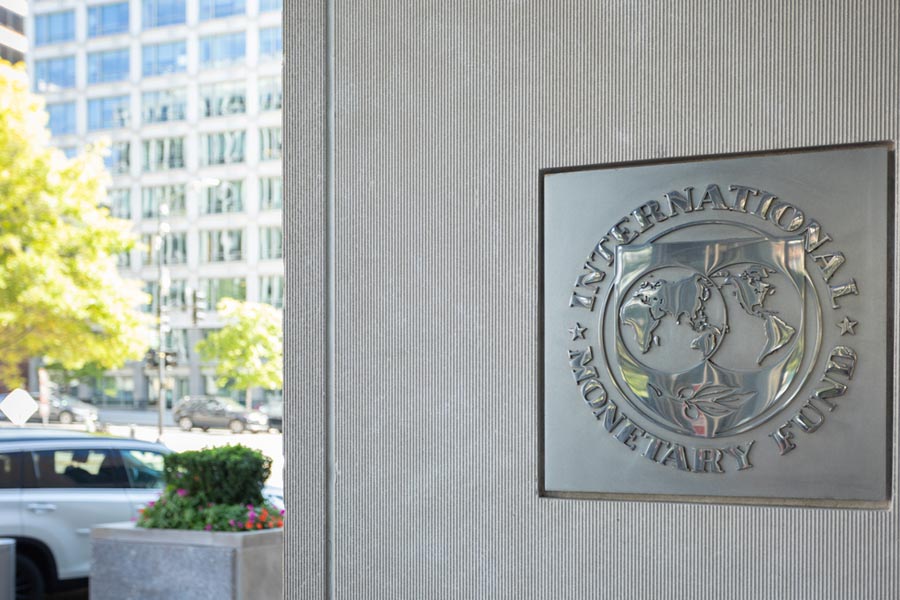The International Monetary Fund has applauded India for maintaining fiscal discipline in an election year, saying that the Indian economy is doing well and continues to be the world's bright spot.
"At this point in time, India's economy is doing well. Growth at 6.8 per cent is very good. Inflation's coming down. We have to make sure that inflation comes down to target and it is there on a durable basis. Macro fundamentals look pretty good," Krishna Srinivasan, Director, Asia and Pacific Department, at the IMF told PTI in an interview.
"One thing I would say is that maintaining fiscal discipline, especially in the election year, for me, has been quite a highlight because countries do embark on fiscal adventures in the election year.
"This government has maintained a discipline, I think, is very important because at the end of the day, sound macro fundamentals are the basis on which countries prosper and have durable growth. So that's very important to maintain that," Srinivasan said.
India, he said, has successfully navigated multiple shocks over the last several years. It's emerging to be one of the fastest major economies in the world. "In fact, for this year, for 2024-25, we project growth at 6.8 per cent led by private consumption and public investment. Inflation is coming down gradually. It's now below 5 per cent," he said.
"If you look at the macro fundamentals, they're pretty solid, despite this being an election year, the government has adhered to fiscal discipline. You look at the reserve position, it's strong. If you look at overall macro fundamentals, it's pretty good," he said, adding that risks to the economy are broadly balanced.
According to the Reserve Bank of India (RBI), India's forex reserves jumped by USD 2.98 billion to a fresh peak of USD 648.562 billion for the week ended April 5. In the previous reporting week, the forex kitty had increased by USD 2.951 billion to USD 645.583 billion, which was an all-time high.
"In the short-term, an important risk is volatile commodity prices with various tensions... But going beyond the short-term, you could think in terms of weather-related shocks, fragmentation, all these are things to worry about in terms of risks to the outlook.
"Of course, there are also risks to the upside when I say private consumption could be stronger. The impact from CapEx spending in India could be stronger with more crowding in the private investment. So those are upside risks. In a nutshell, India has a sweet spot at this point in time," the IMF official said.
Srinivasan said India is among the main drivers of global growth. "This year we expect economic growth at 6.8 per cent. That is led by private consumption and a lot of public investment... India will contribute almost 17 per cent of global growth. So that's one reason why we think it's a bright spot," he said.
"The second driver is Digital Public Infrastructure (DPI). I think this is an important moment, almost like a watershed moment. It's very fundamental because what the DPI does is it enhances productivity by fostering competition and innovation. It also furthers financial inclusion and makes the public sector that much more efficient. So this is a big thing," he said.
That's another reason why the IMF thinks India a bright spot.
"The third reason, is that India has a young and growing population. India is likely to add 15 million people to the labor force every year. There could be other factors which lead us to believe it's a bright spot. But again, when I talk about the young population and to benefit from the demographic dividend, I think a lot of reforms will be needed, which going forward over the medium-term will require a lot of reforms," he said.
For the demographic dividend to be reaped, India has to invest a lot in education and health. "I cannot emphasize this more because it's not just about the population and how to employ them proactively. You're going to have transformations like AI coming into play.
"In India's labor force, the young have to be well skilled, well equipped to deal with these transformation changes to contribute effectively to the economy. In that sense, yes, investment in education, health is very important. That's one thing in terms of reforms,” he said.
"I would also say that making the labor market smoother, functioning well by implementing these labor reforms which have been passed recently is very important. Reducing the number of trade restrictions is important because this is, you give opportunities for people to expand the horizon beyond the domestic economy. Making the country more attractive to business investment is very important.
"Even now when you talk to investors, they talk about the red tape, the bureaucracy, how long it takes to get things done in India. I think those are things which need to be addressed effectively for India to gain from this young population and have long-term growth,” Srinivasan said.
"For the medium-term, we have a growth rate of 6.5 per cent, which is good. But you need more than that. And the last thing I would say is for investors to make well-informed decisions about the economy, about various issues, it'll be important to also at a fundamental level think in terms of our macroeconomic statistics, which can help people make well-informed decisions about investment, which is more durable,” said the IMF official.
Except for the headline, this story has not been edited by The Telegraph Online staff and has been published from a syndicated feed.











